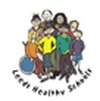Age-expectations
At Talbot Primary School, we teach and assess against the National Curriculum. Our assessments are based on a two factors: overall ability within the curriculum and confidence relating to specific key objectives. We believe this approach allows children to make the best possible progress as they travel through school.
First of all, children are assessed on their overall ability within the National Curriculum. To meet the end of year age-expectations for each subject at Talbot, a pupil must be confident in 85% or more of the objectives for their age. Children who do this are described as Working At Age-expectations.
However, we believe that some objectives in the National Curriculum are more important that others; i.e., skills that underpin future learning. As a school, we know that gaps in important areas will multiply the challenges pupils face in future years. For example, if a Year 2 pupil cannot write in accurate sentences, it will affect their ability to use complex sentences in Lower Key Stage 2. Similarly, if a Year 4 pupil does not know their times tables, they will be unable to solve equivalent fraction problems in Upper Key Stage 2.
Therefore, we have also identified the most important objectives for each year group, which we call Key Progress Indicators. At Talbot, pupils must meet all the Key Progress Indicators (as part of their 85%) to be considered to be Working At Age-expectations.
At each Parent/Carer Evening, we share the Key Progress Indicators that your child will be studying. Below are copies of the leaflets for reference:














